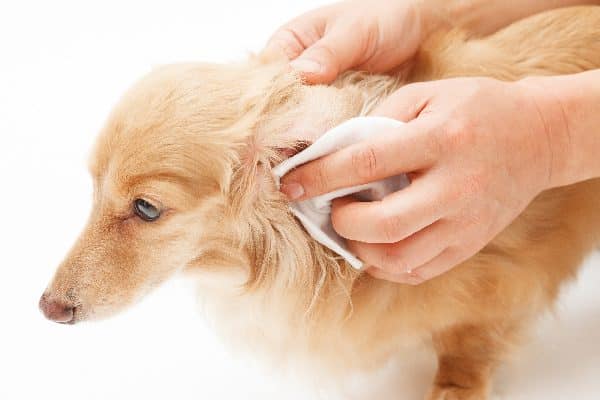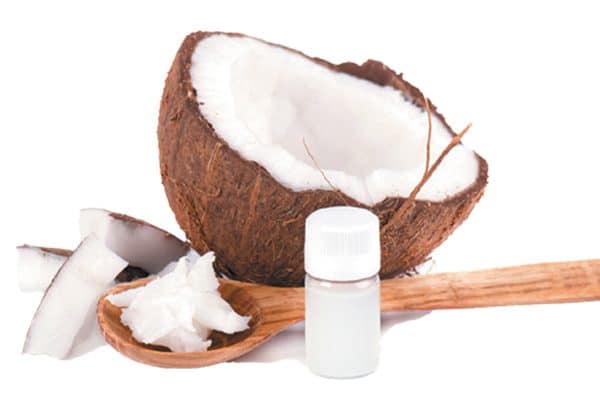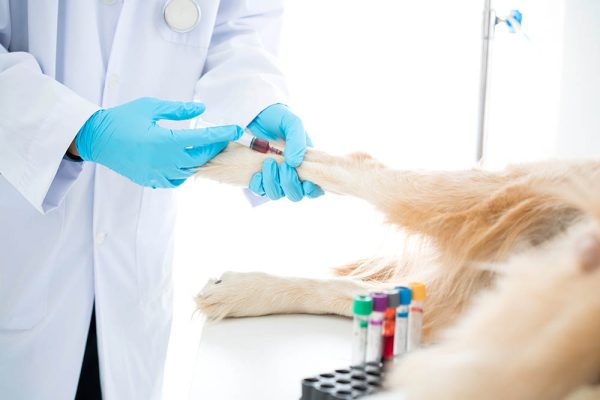Let’s say your dog is gassy or has a small cut on his muzzle or is incurring other minor maladies that fall into the gray zone of health care. Specifically, we’re referring to those situations that do not merit a rushed, emergency visit to the veterinary clinic yet should not be ignored. Sometimes the solution can be natural remedies. So, what are natural remedies for dogs and when should you use them?

Natural home remedies for dogs — the basics

You may find yourself with that ultimate quandary that faces all responsible pet parents: Should you treat the condition with natural remedies or spend the money on a veterinary appointment that really was not necessary? And, could the condition be treated with a plant from your backyard garden instead of a pricey prescriptive medicine that may come with unwanted side effects?
For the health sake of your dog, Dogster turned to veterinarians who have complemented their conventional medical schooling with holistic training for answers.
“We are not suggesting dog owners ‘play’ veterinarian, but there are certainly minor issues that can be treated with herbs, dietary changes, probiotics and homeopathy,” says Elisa Katz, DVM, an expert in holistic medicine who operates the Holistic Veterinary Center in Bourbonnais, Illinois and Downers Grove, Illinois.
Adds Deb Charles, DVM, a veterinarian of 35 years who treats dogs, cats and other companion animals at the Casa Linda Animal Clinic in Dallas, “We are at a time in veterinary medicine where East meets West. I’m always exploring safe holistic options because frankly, my patients are asking for options in treatments.”
In fact, you may be surprised to learn that some safe natural remedies for dogs can be found in your garden, your kitchen cabinet and neighborhood health store. And, the news gets better. In some instances, you can reach for these save-on-a-veterinary-visit choices without the risk of shortchanging your dog’s health.
One caveat: Keep your veterinarian in the loop when it comes to natural remedies for dogs. “The key is communication,” Dr. Katz says. “Always alert your veterinarian if you are giving supplements, herbs and over-the-counter medicines to your dog because some of these items can interfere with prescriptions your dog is taking or may be unsafe to use on dogs.”

The 10 Natural Remedies For Dogs
Let’s run down some natural/holistic options you can consider to treat your dog coping with these situations. Always follow the proper dosage amounts for your dog’s body weight, as overdosing causes its own issues.
1. Natural remedies for bruised or sore muscles

Let’s say your dog overdid it at the weekend agility trials or tangled with a neighbor’s dog. You broke up the fight quickly.
Upon inspection of your dog from head to tail, you notice he has bruising on his abdomen caused by pressure of a tooth dragging across the body. However, there is no evidence of any puncture wounds, and your dog is not showing any signs of pain.
Natural treatment option: arnica. This homeopathic medicine is from a sunflower perennial that blooms in the early spring and is also known as Leopard’s Bane. It is available in pellets, creams and gel forms at health stores.
“I recommend giving Arnica 30 c in pellet form (four to six pellets equal one dose) to your dog to help with pain and resolve inflammation quickly,” Dr. Katz says. (Dosage is same for all dogs.)
2. Natural remedies for minor wounds

To clean a minor wound, you can use a 50-50 mix of green tea and water on a clean gauze pad. “Green tea contains antiseptic properties,” Dr. Katz notes. Or apply a dab of Neosporin, a first-aid ointment, adds Dr. Charles.
3. Natural remedies for wax in the ears

First, sniff and inspect inside your dog’s ear to make sure there are no signs of mites (looks like coffee flakes) or a dirty-sock smell that may merit veterinary care, advises Dr. Charles.
Then make a mixture in a bottle of one-third white vinegar to two-thirds water and a half-teaspoon of isopropyl alcohol. Shake and dab cotton balls with this solution into each ear.
Option B: If your dog’s ears are not itchy — just waxy — apply almond oil on a clean gauze pad and rub inside the ears, suggests Dr. Katz. See more options for cleaning your dog’s ears here.
4. Natural remedies for dry or cracked paw pads

Unless your dog tolerates commercial dog booties, his paws take a lot of pounding and are at risk for becoming cracked. Dabbing those paw pads with coconut oil or vitamin E oil can naturally restore his paw pads to ideal condition.
Coconut oil is also safe to apply on dry, cracked noses, as it acts as an effective moisturizer. For cracked noses, consult with your veterinarian for the underlying cause.
5. Natural remedies for a dry, flaky coat

Add some Omega-3 fatty acids to your dog’s diet to restore natural oils in the coat. Look for liquid Omega-3 products that are human-grade and independently tested to be free of mercury and other possible toxins. Check with your veterinarian for best dosage for your dog.
6. Natural remedies for dog gas

If your dog’s pungent farts are stinking up the home, don’t laugh it off. “Flatulence is often due to a dietary issue,” Dr. Charles says. “There is a reason for the gas, so it is important to determine if the gas is due to an allergy or food intolerance or malabsorption issues.”
Possible remedies to tame your dog’s gassy outbursts also include probiotics, digestive enzymes and adding low-fat yogurt at mealtime.
“With probiotics, make sure the product contains at least four or five different bacterial species and is guaranteed live or guaranteed viable,” Dr. Katz adds. “Open the capsules and sprinkle on food to help rebalance your dog’s gut and strengthen his immune system.”
Work with your veterinarian on setting dosage amounts for your specific dog in advance of giving your dog any probiotics or digestive enzymes.
7. Natural remedies for digestive upset

Reach for nux vomica, a homeopathic remedy effective for dogs coping with minor gastrointestinal issues or nausea due to motion sickness while traveling in cars, says Dr. Katz.
“Just give four to six pellets in the mouth and allow it to dissolve before making a trip in the car. This is a gentle natural option; however, if your dog continues to vomit, you should seek veterinary care to determine the cause, as it may be something other than motion sickness or minor digestive upset.”
In addition, consider ginger root extract to tame your dog’s occasional tummy ache or nausea.
8. Natural remedies for minor sunburn or hot spots

Apply the gooey gel from an aloe vera plant on your dog’s skin pinkened by the sun’s rays or early signs of an itchy hot spot. Aloe vera acts as a great natural skin soother due to its anti-inflammatory and antibacterial properties.
However, beware that the white sap of an aloe vera plant (called latex) is toxic to dogs. Consult your veterinarian before using any commercial aloe vera creams.
Plus, check out some home remedies for your dog’s skin inflammation >>
9. Natural remedies for bad dog breath

After ruling out any serious dental issues like gingivitis or a broken tooth, you can add one to two drops of peppermint or spearmint oil into your dog’s water bowl to freshen up his breath. See more home remedies for your dog’s bad breath right here.
10. Natural remedies for general anxiety or stress in dogs

If your dog gets stressed due to thunderstorms, veterinary visits or other issues, Dr. Charles recommends the use of Zylkene, a natural remedy in capsule form made from a milk protein that creates a feeling of calmness.
“Many of my clients really love this holistic answer for their dogs’ anxiety,” Dr. Charles notes. Other options include D.A.P. (a dog-appeasing pheromone diffuser), lavender-infused collars and Rescue Remedy (a commercial blend of flower extracts).
“I’m a big fan of Rescue Remedy because it does not interfere with other treatments,” Dr. Katz says. “It is best given before the dog gets hyped up.”
Before giving any remedy to your dog, we recommend you consult a veterinarian for the best advice on which would be the best treatment for your pup.
If you need to speak with a vet but can't get to one, head over to PangoVet. It's our online service where you can talk to a vet online and get the advice you need for your dog — all at an affordable price!

Parting advice on natural remedies for dogs:
If a natural remedies for dogs work, more amounts are not always better, and always alert your veterinarian of any home treatment you give your dog.
“Our mantra is to do no harm,” Dr. Charles says. “If there is no fact-based evidence about a natural remedy, then it can do harm. Maintain an open line of communication with your veterinarian to keep your dog safe.”
Read more about natural remedies for dogs on Dogster.com:
- Help Ease Your Dog’s Allergies With These 5 Natural Remedies
- 5 Home Remedies for Fleas on Dogs
- Homemade Dog Shampoo — 3 Simple Recipes
- Kennel Cough Treatment — 4 At-Home Remedies for Kennel Cough
- Home Treatment for a Dog Abscess — If It’s a Visible Skin Abscess
- 6 Reasons Cleaning With Vinegar is Good For Your Dog and Your Home
Arden Moore, The Pet Health and Safety Coach™, is a pet behavior consultant, master certified pet first-aid instructor, author and host of the Oh Behave Show on Pet Life Radio. Learn more at ardenmoore.com.
Featured Image Credit: bruev | iStock / Getty Images Plus.



















2 Responses
my furbaby is 15 years old .he started hacking about a week ago .But its getting worse. is there anything you can suggest to us what we can do to help him threw this ??
Hello Cecilia,
Thank you for your message and sorry for a bit of a delay. This sounds like something that should be consulted with a veterinarian. You can make a consultation from your home if you book a video call appointment with one of our professional veterinarians from www.PangoVet.com. They will gladly take a look at your pup, let you know their opinion and what you can do to help.
Best of luck!